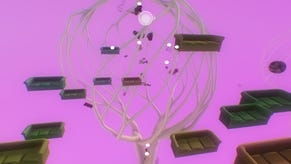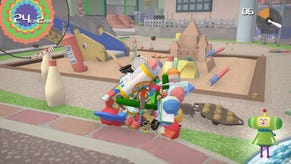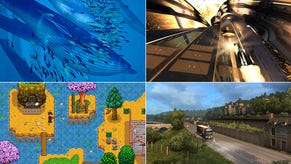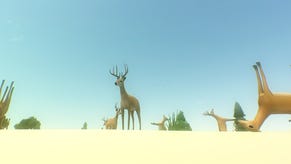Wot I Think: Everything
Bathos: The Game
I am a spruce beetle. I call to two other spruce beetles nearby and now I am all of them. I tell them to dance and they begin to skitter of their own volition, making concentric circles and infinity signs and all manner of patterns. Each time a circle fills at the top of the screen - the only visible UI element - I press A in order to spawn another spruce beetle which joins in the dance. I do this for seventeen minutes, until there is a thrumming mass of spruce beetles. Eventually I've had enough and so I become a snowball.
This is what Everything [official site] is about.
Everything is a game about being anything. You begin as an object and then transition into smaller or larger objects, shifting from polar bear to penguin to plant to tree to rock and so on. While controlling each creature or object, you're able to sing, to attract other similar or identical objects under your control in order to form a flock, and to dance. This invites playful experimentation: what noise does a snowball make when it sings? How does a tree move?
Then you discover you can also ascend and descend from your present scene, zooming in to a snowball to control the snowflakes and bacterium that reside upon it, or zooming out from your island home such that you can control the island itself, pushing this way and that to cause the landmass to morph across the planet's surface. Up and up you can go to control the planet, then the solar system and beyond, or down down down past germs, to where objects are unrecognisable but the screen is awash with shapes and colour. Go far enough in either direction and you loop back around.
Everything is created by David OReilly, who previously made Mountain, about being a mountain. In that game, random objects would crash upon the mountain's surface, the weather would gently shift, and the mountain would think.
It's the same here. What does a VHS tape think? While close to one, a thought bubble may appear above its head, letting you find out. Some thoughts are philosophical, some reflective, some maudlin. Occasionally an object will instead offer the opportunity to play an audio file which each time offers a new chunk of deceased philosopher Alan Watts talking about interconnectedness. It's here that the game is most at risk of self-serious didacticism, but for me the specifics of the written thoughts or Watts' monologues aren't important. Instead, their seriousness rubs against the silliness of the rest of the game in a way that enhances its absurdity. Very occasionally - and if you're in the right frame of mind - both Mountain and Everything juxtapose words and image together in a way that feels profound. At the very least, they have the potential to give you the warm fuzzies.
Still, the game is at its best when you're simply messing around. Bit by bit, your experimentation unlocks new functionality. Soon you can spawn new copies of yourself not just periodically by dancing, but at will, creating huge flocks of biplanes or factories. Then you can access a menu to spawn any creature you desire at any level of scale, creating lamppost-sized planets and island-sized penguins. By the time you unlock the New Game+ mode a few hours in, it feels as if every rule the game established in its first hour has been knocked down. (Yes, there is no real challenge to Everything, but it has an NG+).
Ascending and descending from the planet level lets you find ice worlds, water worlds, planets where the islands are covered in cities... Even though the game is called Everything, I found myself surprised by just how much Everything contains. I'd think I'd seen an example of each type of thing it had to offer, wander away from my computer for a while, and return to find the game playing itself in a setting I've never seen before with its own wholly new ecosystem of objects.
It accomplishes this variety with shortcuts that only enhance the playfulness of exploring. For example, there's very little animation; most objects move by rolling, with even animals flipping jerkily head-over-feet. Those that don't roll, slide. Trees and other plants, to answer my self-posed question above, move by growing copies of themselves while the original fades away.
There's lots and lots more to discover that I'm not saying, but even if I were to exhaustively describe all the game has inside it, you'd get more from experiencing it yourself. Everything looks great, using depth of field, particle effects and a sparingly lush palette to create scenes of beauty. But the real pleasure of it also exists not in any specific thing you can be or do, but the meandering path you choose between them for yourself.
You should know by now whether you're the sort who could enjoy Everything; some will certainly dismiss it as a trifle. For me, at times, Everything feels like the game Spore should have been. When I watched the early presentations of that game's silly creature creator and its invocation of Powers of Ten, I wasn't imagining a fiddly, shallow strategy game, but an experience that hoped to approximate the awe I sometimes feel when stargazing or can tap into by listening to Carl Sagan talk. By throwing out most of Spore's traditional mechanics in favour of a cross between Katamari Damacy and Nested, Everything gets closer to sublimity. And though I don't think it gets all the way there - not for me, not right now - the silliness is constant and delightful.
Everything is out now on Windows and Mac via Steam, GOG and Humble for £11/$15/€15.

























